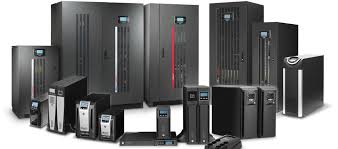Types of UPS

From Standby UPS to Line-Interactive and Double Conversion UPS: Everything Explained in Simple Words.
There are many factors that deserve your attention before purchasing of UPS unit like price, capacity, runtime, power factor correction, and more, the first thing you should decide is to narrow down the UPS technology. There are multiple kinds of UPS technology, each has its unique features, capabilities, and applications. This blog will give some to-the-point and straightforward information regarding each type of UPS and suggest its suitability as well.
Table of Content
- Types of UPS Technologies:
- Standby UPS System:
- Pros of Using Offline UPS System:
- Cons of Using Offline UPS System:
- Applications of Offline UPS Systems:
- Line-Interactive UPS Systems:
- Applications of Line Interactive UPS Systems:
- Double Conversion UPS System:
- Here are the advantages and Disadvantages of the Double Conversion UPS System:
- Disadvantages Linked with Double Conversion UPS:
- A Few Words About Morgan Ingland FZ LLC:
Types of UPS Technologies:
There are three types of UPS technology:
- Standby UPS
- Line-Interactive UPS
- Double Conversion UPS
Standby UPS System:
Standby UPS system or Offline UPS system is a type of backup power supply that protects the connected load from power outages, voltage fluctuations, and power surges. Under normal conditions, power is supplied directly from the utility to the connected load and the battery is in the state of charging. But there is disruption or interruption to the power supply, Standby UPS switches to battery power.
Standby UPS system has some distinct pros and cons which are discussed below:
Pros of Using Offline UPS System:
- Standby UPS systems are typically cost-effective in comparison with other UPS technologies.
- Since the charger does on remain on, this UPS system has more efficiency. In addition, they are designed in such a way as to remain on when the power goes off, they consume less energy, so they are energy-efficient as well.
- They are easy to install and maintain because they don’t have many components, so they are more suitable for medium and small businesses.
Cons of Using Offline UPS System:
- Offline UPS system is not suitable for sensitive equipment because it has a transfer time of a few milliseconds when it switches power from utility to battery. This transfer time causes some disruption of power to the connected load.
- UPS systems can only provide basic protection against power outages, power surges, or voltage fluctuations. They don’t provide protection against quality issues like frequency fluctuations or harmonic distortion. Furthermore, the output of UPS systems is not reliable as well, it includes sometimes brownouts and spikes.
- The battery power of this UPS is also very short because they are not being charged and discharged consistently like other UPS systems.
- The runtime of this system is also limited than other UPS systems which hardly reach a few minutes. This limited runtime is not enough to shut down PCs properly or save the important data in the wake of a power outage.
Applications of Offline UPS Systems:
Due to the restrictions imposed by the Offline/Standby UPS system, these are usually deployed where is good quality power but there is the issue of short-term power outages. Some important applications:
- I. Home offices
- II. Small Businesses
- III. Point of Sales (PoS) systems in retail or restaurants
- IV. Telecommunication equipment
- V. Surveillance systems, access control systems, and other security systems.
Line-Interactive UPS Systems:
Unlike the Standby UPS system, Line-Interactive UPS provides intermediate power protection. They count on an automatic voltage regulator to correct minor voltage fluctuations without any switching from the main supply to battery backup. They keep the inverter in line.
Here are some advantages and disadvantages of the Line-Interactive UPS system:
Advantages:
- I. They are useful in extending battery life and preventing unnecessary usage of battery as well because automatic voltage regulators in Line-Interactive UPS can correct minor voltage defects without resorting to battery power.
- II. They are more cost-effective than double conversion or online UPS systems and provide a good balance between cost-effectiveness and power protection and conditioning.
- III. Line-Interactive UPS systems have faster transfer time than online UPS systems which ensures that there is minimum interaction of power supply to the connected load.
- IV. In addition, they have a very rugged design and structure, lower operating temperature, and less electricity consumption as well.
Disadvantages:
- I. They provide limited power protection, particularly, they are unable to protect connected devices from high energy surges, voltage spikes, and others. They are impracticable above 5KVA. They don’t provide any power factor correction or safeguards against power irregularities.
- II. Though the backup time is more than offline UPS systems, ranging between 10-30 minutes, this backup time could not be sufficient for devices running critical applications that generally warrant longer backup time.
- III. They are not for large corporations which demand robust and powerful power protection, they have limited scalability and are more suitable for small and medium-sized enterprises.
- IV. They are more complex set-up which sometimes leads towards malfunction or even risk of failure.
Applications of Line Interactive UPS Systems:
Line-interactive UPS systems are deployed where a moderate level of power protection is required. Here are some applications of Line-Interactive System:
- I. Small to medium enterprises
- II. Home offices
- III. Personal Computers
- IV. Point of Sale Systems
- V. Network equipment
- VI. Security systems
Double Conversion UPS System:
Double Conversion UPS system offers the highest level of power protection to the connected equipment by isolating them from raw utility power. They work by converting incoming AC power to DC and then back to AC, therefore termed Double Conversion, for ensuring the maximum level of power conditioning. They provide high-quality power output free from power sag, power surge/spike, brownout(under-voltage), over-voltage, electrical line noise, frequency variation, switching transient and harmonic distortion.
Here are the advantages and Disadvantages of the Double Conversion UPS System:
Tablets also lack some serious capabilities and suffer from certain limitations:
1- Reliability and Power Conditioning:
- They are best known for offering a higher level of reliability and power protection against power outages, voltage fluctuations, and other power anomalies. They have an internal static bypass that allows you to keep your critical load online for repair or replacement in the event of catastrophic power failure.
2- Quick Response Time:
- Double Conversion UPS systems are recognized and well-reported for having fast response time that can quickly switch to battery backup in the wake of a power outage or other disruption.
3- Scalability
- They are very accommodating of the growing needs of businesses and can easily be scaled up to meet the expanding needs of power protection.
4- Noise Reduction:
- They are helpful in reducing electromagnetic interferences and noise produced by connected loads.
Disadvantages Linked with Double Conversion UPS:
Tablets also lack some serious capabilities and suffer from certain limitations:
1- Steep Cost:
- The higher level of reliability and power quality means that Double Conversion UPS cost more in comparison with other types of UPS technologies.
2- Limited Efficiency:
- Since Double Conversion UPS keep the inverter on for converting incoming AC to DC and then back to AC, they have limited efficiency compared with other UPS systems.
3- Requirement of Cooling Equipment:
- The continuous conversion process generates heat that demands the installation of more cooling equipment. This adds to the overall cost.
4- Bulkier and Large in Size:
- Double Conversion UPS systems are large in size and bulkier which can cause problems for businesses struggling for space.
5- Complicated Design:
- The installation, maintenance, and operation of these UPS systems demand specialized and sophisticated IT skills. You need to hire a high-skill team to ensure optimum performance.
A Few Words About Morgan Ingland FZ LLC:
Morgan Inland FZ LLC is a leading e-commerce firm in the Middle East and beyond and specializes in supplying IT hardware of every kind as well as IT solutions and services. We pride ourselves to provide our customers with every kind of hardware that they need including, but not limited to,UPS replacement batteries UPS replacement batteries, Line-Interactive UPS, Double Conversion UPS, standby UPS, network and server UPS, data center UPS, UPS interface cables, and other UPS accessories. What’s more, we have a dedicated team of power protection specialists and solution designers to determine the best UPS system that meets your equipment requirements and operational needs of power protection, regulation, and stabilization.
We are committed to serving you day in and day out. Feel free to contact us at +971 72091222 or email us at marketing@miatlantic.ae for further any kind of end-to-end solution design you demand.






